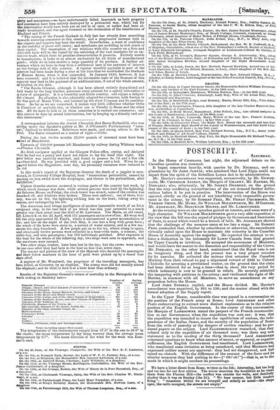POSTSCRIPT.
SATURDAY.
It began somewhat heavily, with queries by Dr. NicHoLL, and ex- planations by Sir Joan JERVIS; who admitted that Lord Elgin could not depart from the spirit of the Rebellion Losses Act in its administration. Mr. Herries's amendment was supported, unreservedly, by Mr. NEWDE- GATE, Mr. CHISHOLM ANSTEY, the Marquis of GRABBY, Mr. BANRES, Mr. DISRAELI; also, reluctantly, by Mr. SIDNEY HERBERT, on the ground that the very conflicting interpretations of the act demand further delibe- rations before it be put in practice. The intervention of the House was opposed, chiefly on the ground of not interfering with responsible govern- ment in the colony, by Sir ROBERT PEEL, Mr. HENRY DRUMMOND, Mr. VERNON SMITH, Mr. HUME, Sir WILLIAM MOLESWORTH, Mr. M`GREGOR, Mr. ADDERLEY, Mr. MONCRTON MILNEB, and Mr. LABOUCHERE.
As the evening wore on the speeches gained an interest, and some were of a high character. Sir WILLIAM MOLESWORTH gave a very able exposition of the view that the bill was the sequel of pledges by Governors and Secretaries of State, to annul which would be a breach of faith. Mr. ADDER= showed that the challenge of the measure came at too late a stage. Sir ROBERT PEEL .contended that, whether by coincidence or otherwise, the amendment virtually called upon the House to maintain the minority in the Canadian House of Assembly against the majority. He regarded the attempt to en- force a distinction in the indemnity for Lower Canada from that granted for Upper Canada as invidious. He accepted the assurances of Ministers, and would leave the matter to the discretion and responsibility of the Crown. Mr. DISRAELI, on the other hand, maintained that the Royal veto is not an imaginary thing, and that the present was a very proper occasion for its exercise. He collected the animus that actuates the Canadian Ministry from their refusal to pay a stipulated reward of 2501. to Colonel Chisholm for arresting a proclaimed traitor, on the ground that the claim had been deferred for so long a time—that is, since the very period for which indemnity is now to be granted to rebels. He severely criticized the tampering with petitions in the colony; and vindicated the right of Mr. Herries, in common with all Members, to move an amendment on any propositon before the House. Lord JOHN RUSSELL replied, and the House divided. Mr. Herries'e amendment was negatived, by 291 to 150; and the matter closed with the formal adoption of the Supply report.
In the Upper House, considerable time was passed in a conversation on the position of the French army at Rome; Lord ABERDEEN and other Peers endeavouring to extract more distinct explanation as to the relative position of the English Government. In the course of this conversation, the Marquis of LANSDOWNE stated the purport of the French communica- tion to our Government when the expedition was sent out it was, that the expedition was intended to insure the equilibrium of nations, the inde- pendence of the Italian States, and the security of the population of Rome from the evils of anarchy or the dangers of sudden reaction: and he pro- duced papers on the subject. Lord ELLENBOEOUGH remarked, that they related only to the expedition of six thousand men: was there any new statement as to the sending of the thirty thousand? Lord ABERDEEN reiterated questions to know what amount of assent, or approval, or negative sufferance, the English Government had manifested. Lord LANSDOWNE, who manifested some irritation at being catechized, said that Ministers had expressed neither assent nor approval: they had not disapproved, and had raised no obstacle. With the difference of the amount of the force and its ulterior measures they had nothing to do—(" Ohl oh!")—that is, as to the
mode in which it might conduct its proceedings. '


























 Previous page
Previous page